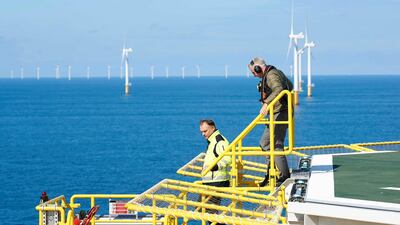Leaders from government, business and civil society gather this month for two of the year’s most important climate change events: the 24th World Energy Congress in Abu Dhabi, which took place last week, and the United Nations Climate Summit in New York, set to take place later this month. On the agenda at both events are what actions to take to help mitigate global warming while meeting the world’s growing energy demands.
Addressing climate change is the shared responsibility of everyone on the planet, but it is a confluence of technological breakthroughs that gives the world its biggest opportunity to address global warming and meet our commitments to the UN’s Sustainable Development Goals.
These technologies, such as the Internet of Things, lithium-ion chemical batteries for energy storage, cloud computing, machine learning and artificial intelligence, can help developed countries further integrate renewable energy into the grid, and developing economies to secure the reliable, affordable energy supplies they need to grow.
Recent alarming weather events, such as the UN World Meteorological Organisation announcing that June was the hottest month on record and the devastating impact of Hurricane Dorian on the northern Bahamas just last week, mean that it has never been more vital to push for closer collaboration among stakeholders to increase financing flows. Financing remains a challenge in emerging markets where energy is needed the most.
Overall spending may have fallen last year, but the reality is that green investment has exceeded $300 billion (Dh1.1bn) for the past five years, while the rate of installation of renewable energy projects has also increased every year since 2000. While the modest fall in investment has been driven primarily by significant reductions in the cost of renewable energy technology per megawatt, renewables are now increasingly attractive for investment for broader and diverse sources of capital, more so when you consider the potential in emerging markets.
A good example of this is the December 2018 hybrid refinancing deal for the 402-megawatt Dudgeon offshore wind farm in the United Kingdom, which is owned by Equinor, Masdar and China Resources Group. The refinancing included approximately £561 million (Dh2.6bn) of commercial bank debt and £706m of senior security notes privately placed with institutional investors. Both tranches were oversubscribed, reflecting strong credit features and investor interest.
Technology is also key to scaling up renewables. As installed capacity increases, the challenge of balancing loads, managing demand and developing storage capacity increases.
According to a recent Irena report, by 2030, the cost of installed battery storage systems could fall by 50 to 66 per cent. The latest technological advances are seeing lithium-ion batteries store enough energy to be able to supply the grid with electricity round the clock.
Smart batteries are also being developed to mitigate the intermittent nature of wind power. A case in point is Batwind in Scotland, the first smart battery system connected to an offshore wind farm, which stores and then releases electricity to the grid when it is most needed.
The Noor Midelt project is another example of innovation and record-low pricing. The project, which will have a total installed capacity of 800MW, is the world's first advanced hybridisation of concentrated solar power and photovoltaic technologies, with a storage capacity of five hours. On completion, it will provide dispatchable solar energy during the day and until five hours after sunset for a record-low tariff at peak hours of 0.68 Moroccan dirhams (Dh0.26) per kilowatt-hour.
With solar and wind power expected to receive more than 80 per cent of the $11.5 trillion expected to be invested in new power generation globally between now and 2050, it is also important to note that grid integration and efforts to unlock emerging markets will spur further investment in renewables.
While financing can be more difficult for developing countries to obtain for a number or reasons – low credit ratings, underdeveloped supply chains and frequently changing regulations, to name only a few – these emerging economies have a critical need for modern energy services to meet the demand of their growing populations.
To that end, Masdar is one of 25 signatories from government and business to the Abu Dhabi Sustainable Finance Declaration issued by Abu Dhabi Global Market to create a robust and sustainable finance hub serving Mena. A second edition of the Declaration will be launched at the Abu Dhabi Sustainable Finance Forum during Abu Dhabi Sustainability Week in January, 2020.
Meanwhile, ADGM is developing regulatory guidelines for sustainable finance in the region and is working with the likes of the UAE Ministry of Climate Change and Environment, Abu Dhabi Securities Exchange, Dubai Financial Market, the UAE Central Bank and the Securities and Commodities Authority to help connect finance with projects. And through the Global Standardisation Initiative, the International Renewable Energy Agency, which is headquartered at Masdar City, is bringing together financial institutions, policymakers and the private sector to standardise the legal documentation governing renewable energy power projects.
The economic argument for renewables is undeniable thanks to technology-driven price reductions. We are also seeing the financial community respond to the growing public awareness of the need for decisive action to mitigate climate change. This is an encouraging sign.
But closer collaboration between all stakeholders – governments, multilateral bodies, investors and lenders – to ensure stable regulatory regimes, contracts that are enforceable and bankable, and proper access to grid infrastructure in emerging countries is the next step forward in the growth of renewable energy investment.
Mohamed Jameel Al Ramahi is the chief executive of Masdar

